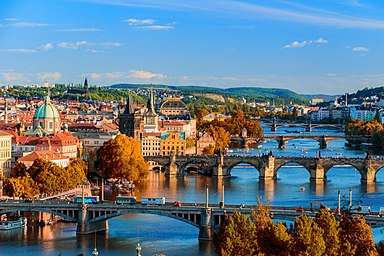River VLTAVA /Moldva/
Vltava is the main river of the Czech Republic
Vltava River, German Moldau, river, the longest in the Czech Republic, flowing 270 miles (435 km). Its drainage basin is 10,847 square miles (28,093 square km).
The river rises in southwestern Bohemia from two headstreams in the Bohemian Forest, the Teplá Vltava and the Studená Vltava. It flows first southeast, then north across Bohemia, and empties into the Elbe (Czech: Labe) River at Mělník, 18 miles (29 km) north of Prague.
 Vltava at Prag
Vltava at Prag
Prague and České Budějovice are on the Vltava. At České Budějovice, in the river’s middle basin, is an extensive lake region. The middle and lower course of the Vltava is gorgelike, with rapids and incised meanders. Large hydropower dams with associated lakes provide recreational facilities. The Vltava’s principal tributaries are the Lužnice and Sázava (east) and the Otava and Berounka (west). The river is celebrated as the second subject in a cycle of six symphonic poems under the general title of Má vlast (“My Country”) by the Czech composer Bedřich Smetana.
